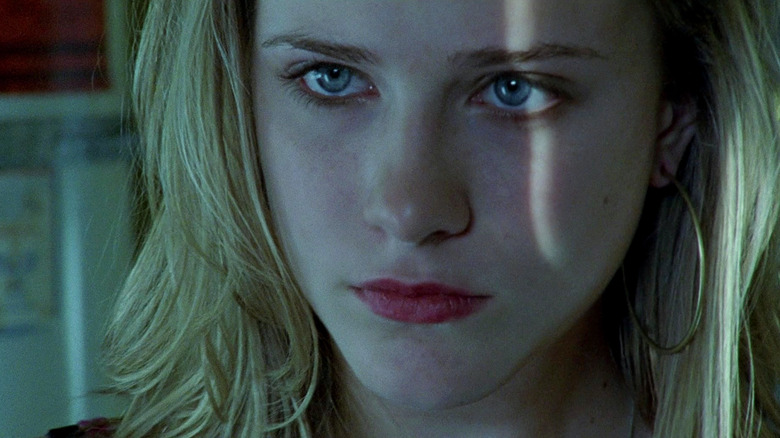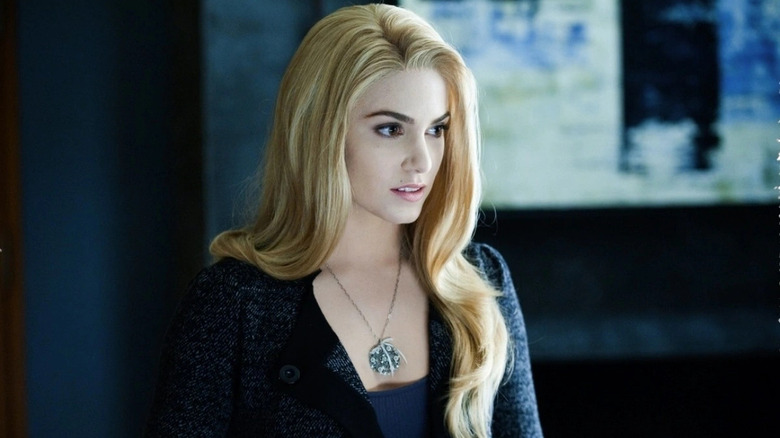Catherine Hardwicke Was Paid Just $3 For Directing Thirteen, But It Was Worth It
The life of a movie director isn't all glamour and red carpets. Getting movies made, particularly personal stories or passion projects, can be exceedingly difficult. Then if the movie fails to turn a profit, the director will be left more precarious and with fewer doors open than before. Oftentimes, directors will make compromises to get their movies realized — particularly financial compromises. Catherine Hardwicke, in a recent interview with Yahoo News, detailed her struggles to make her debut "Thirteen."
The film is about two (you guessed it) 13-year-old delinquents, Tracy (Evan Rachel Wood) and Evie (Nikki Reed). According to Hardwicke, the characters' ages and the sensual subject matter meant no studio would touch it: "Every financier said, 'No, we can't make it. How could we make a movie that's gonna be R-rated with an unknown 13-year-old girl in the lead?'"
"Thirteen" was ultimately shot for $2 million (raised by Hardwicke herself with independent equity) over 24 days. Hardwicke used her own possessions for props and costuming. The handheld cameras add to the aesthetic but were likely a cost-saving measure too. How much did Hardwicke herself earn? $3 — no, no zeros missing.
Hardwicke has mentioned her paltry pay before to Refinery29, which published a making-of feature about "Thirteen" in 2018 for the film's 15th anniversary. With that $3 figure, it might seem like Hardwicke made the movie purely for passion, but that's really not true. Finances can be deceiving in the movie business and Hardwicke used "Thirteen" as a career launcher.
The true measure of success
Hardwicke's "Thirteen" salary was as follows: $2 for co-writing the script and $1 for directing. Presumably, this was an arbitrary salary to ensure she was officially credited for her work. Directors forgoing payment isn't unheard of. George Clooney, who has a bit more Hollywood clout than Hardwicke does, self-financed his 2005 film "Good Night and Good Luck," taking home only a single dollar each for his directing, writing, and acting duties.
However, "Thirteen" turned out to be a (relatively) huge success. It was admitted to the 2003 Sundance Film Festival, where Hardwicke won for directing (in the drama category). The film was picked up for distribution by Fox Searchlight and grossed over $10 million worldwide. A tiny investment yielded a solid profit. Due to the film's success, the makers earned residual payments (during her interview with Refinery29, Hardwicke mentioned she'd recently received an $18,000 residual check).
In filmmaking, success isn't measured with just cold hard cash, but also in parlaying a hit into more work. Hardwicke succeeded there too, going on to direct "Lords of Dogtown" in 2005 ("Thirteen" for skater boys), "The Nativity Story" in 2006, and then "Twilight" in 2008. At the time, the latter film was the highest-grossing feature directed by a woman (it's since been eclipsed, though — "Barbie" recently set a new record). Gallingly, she didn't direct the sequels due to "creative differences."
"Twilight" was the (financial) peak of Hardwicke's directing career, but she's continued to regularly make films, such as "Prisoner's Daughter" and "Mafia Mamma."
Residuals are often the real money maker for artists and actors, but taking a deal contingent on them requires faith in your project. Hardwicke had just that in "Thirteen", which is why she took a deal another filmmaker might have balked at and reaped long-term rewards from it.

